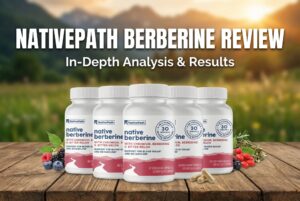
When it comes to gut health supplements in America, you might find yourself overwhelmed by the choices and bold claims. While some ingredients like probiotics and prebiotics promise significant benefits, the reality can be quite different. Not all products deliver what they advertise, and understanding the science behind them is crucial. So, what should you really know before making a decision that could impact your health?
Understanding Gut Health: What It Means and Why It Matters
Understanding gut health is crucial because it plays a significant role in your overall well-being. Your gut houses trillions of bacteria that influence digestion, immunity, and even mental health.
When your gut functions well, it helps efficiently break down food and absorb nutrients. However, an imbalance can lead to issues like bloating, fatigue, or even mood swings. You mightn’t realize that stress, diet, and lifestyle can all impact your gut health.
Prioritizing a balanced diet rich in fiber, probiotics, and hydration can support a thriving microbiome. Remember, a healthy gut can enhance your energy levels and immune response, making it essential to pay attention to what you eat and how you care for your digestive system.
Common Ingredients in Gut Health Supplements
A well-functioning gut is often supported by various supplements designed to promote digestive health. You’ll commonly find ingredients like fiber, which helps regulate bowel movements, and prebiotics, which feed beneficial gut bacteria.
Digestive enzymes are another popular choice, as they assist in breaking down food for better nutrient absorption. Additionally, you might encounter herbal extracts such as peppermint and ginger, known for their soothing properties.
Many supplements also include vitamins and minerals that support overall gut function, like zinc and vitamin D. Understanding these ingredients can help you make informed choices when selecting gut health supplements tailored to your needs.
Always consult your healthcare professional before starting any new regimen to ensure it’s right for you.
The Role of Probiotics: Are They Effective?
While many people turn to probiotics in hopes of improving their gut health, the question of their effectiveness remains a topic of debate.
Research shows that certain strains can benefit your digestive system, but results vary depending on individual health conditions. You might find relief from issues like bloating or constipation, but not everyone experiences the same improvements.
Additionally, factors like diet, lifestyle, and existing gut flora play significant roles in how probiotics work for you. It’s essential to choose the right strains for your specific needs, as some may not be beneficial for everyone.
Before starting any supplement, consult your healthcare provider to ensure it’s a good fit for your gut health journey.
Digestive Enzymes: Do They Really Help?
How do digestive enzymes fit into the conversation about gut health? These supplements aim to enhance your body’s ability to break down food, potentially improving nutrient absorption and reducing digestive discomfort.
If you often experience bloating or gas after meals, you might wonder if digestive enzymes could help. They work by providing the enzymes your body sometimes lacks, especially as you age or if your diet is low in certain nutrients.
However, while some studies suggest they can aid digestion, results vary from person to person. It’s essential to consult a healthcare professional before trying them, as they may not be necessary for everyone.
Ultimately, understanding your body’s unique needs is key to making informed choices about gut health.
The Science Behind Prebiotics and Their Benefits
Prebiotics play a crucial role in supporting gut health by serving as food for beneficial bacteria in your digestive system. By consuming prebiotics, you’re effectively nourishing these good microbes, which helps them thrive and maintain a balanced gut environment.
Common sources of prebiotics include foods like garlic, onions, bananas, and asparagus. When these fibers reach your gut, they ferment and produce short-chain fatty acids, which can reduce inflammation, improve digestion, and enhance your immune function.
Including prebiotics in your diet can also boost nutrient absorption and may help regulate your appetite. As you prioritize gut health, consider incorporating more prebiotic-rich foods to support the beneficial bacteria that play an essential role in your overall well-being.
Evaluating the Claims: What Research Says
Understanding prebiotics lays the groundwork for evaluating the myriad claims surrounding gut health supplements. Research shows that while prebiotics can support digestive health, the effectiveness of many supplements is often overstated.
You’ll find numerous products boasting miraculous benefits, but not all are backed by solid science. Studies indicate that specific strains of probiotics can positively impact gut flora, yet results vary greatly among individuals.
It’s essential to scrutinize the evidence supporting each product’s claims. Look for studies published in reputable journals and check for clinical trials that demonstrate tangible results.
Choosing the Right Gut Health Supplement for You
What factors should you consider when choosing the right gut health supplement? First, look at the ingredients. Check for probiotics and prebiotics that align with your specific needs.
Next, consider the strains of bacteria used; different strains serve various purposes.
Third, pay attention to dosage. Ensure you’re getting an effective amount for it to be beneficial.
It’s also wise to research the brand’s reputation—opt for companies that provide transparency and third-party testing.
Don’t forget to consult your healthcare provider, especially if you have underlying health conditions.
Lastly, consider your lifestyle and dietary preferences; some supplements might contain allergens or ingredients you wish to avoid.
Making an informed choice can significantly impact your gut health journey.
Conclusion
In conclusion, navigating the world of gut health supplements can be tricky. While some products may offer benefits, it’s crucial to do your homework and consult with a healthcare provider. Remember, not all supplements work the same for everyone, and claims can often be misleading. By understanding your unique health needs and the science behind these ingredients, you can make informed choices that truly support your gut health. Trust your instincts and prioritize what works best for you.






